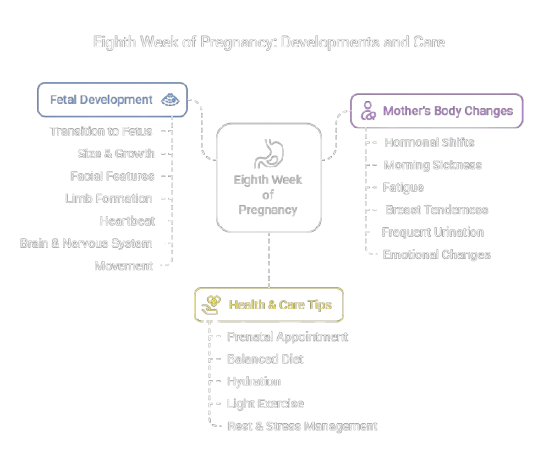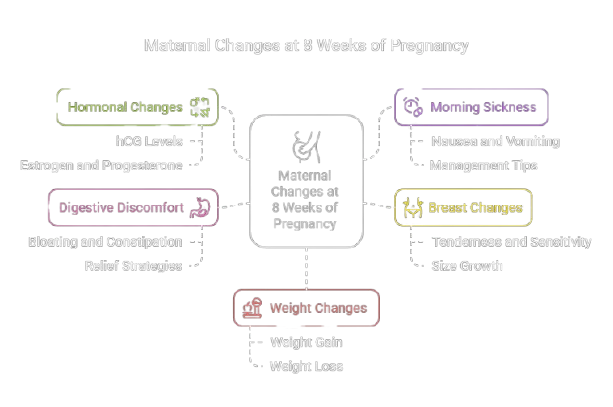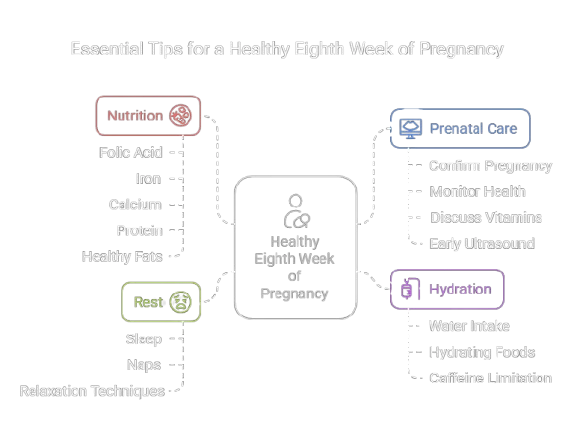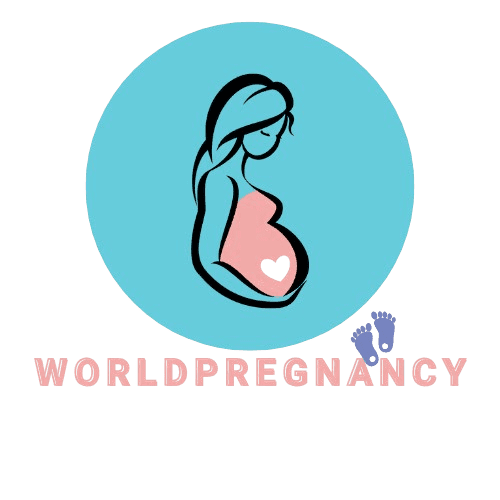At 8 weeks pregnant, your baby transitions into a fetus with a strong heartbeat and growing limbs. Learn about fetal development, symptoms, and essential care tips to ensure a healthy pregnancy.
Pregnancy is a transformative journey, and the eighth week marks a significant milestone in fetal development. By this time, the embryo has transitioned into a fetus, and rapid changes are occurring both for the baby and the mother. This guide is designed to provide expecting mothers and those planning for motherhood with detailed, accurate, and supportive information about the eighth week of pregnancy. Let’s dive into what you can expect during this exciting phase.
What Happens During the Eighth Week of Pregnancy?
During the eighth week of pregnancy, significant developments occur in both the fetus and the mother’s body. Here’s a breakdown of what happens:
Fetal Development
- Transition to Fetus: The embryo is now officially called a fetus.
- Size & Growth: The baby measures about 1.2 cm (0.5 inches), similar to a kidney bean, and may reach 16mm by the end of the week.
- Facial Features: eyes, nose, and ears become more defined.
- Limb Formation: Tiny hands and feet appear, with webbed fingers and toes.
- Heartbeat: The heart beats 150-170 beats per minute, which may be visible on an ultrasound.
- Brain & Nervous System: Nerve pathways develop, laying the foundation for movement and reflexes.
- Movement: Although too early for the mother to feel, the baby starts making spontaneous movements.

Changes in the Mother’s Body
- Hormonal Shifts: Increased levels of hCG, estrogen, and progesterone cause pregnancy symptoms.
- Morning Sickness: Nausea and vomiting may peak around this time.
- Fatigue: Higher progesterone levels contribute to exhaustion.
- Breast Tenderness: Breasts may grow and feel sore as they prepare for milk production.
- Frequent Urination: The growing uterus puts pressure on the bladder.
- Emotional Changes: Mood swings due to hormonal fluctuations.
Health & Care Tips
- Prenatal Appointment: If not already scheduled, the first prenatal checkup should be booked.
- Balanced Diet: Eat nutrient-rich foods like leafy greens, lean proteins, and whole grains.
- Hydration: Drink plenty of water to avoid dehydration.
- Light Exercise: Walking and prenatal yoga can help with circulation and mood.
- Rest & Stress Management: Proper sleep and relaxation techniques are essential.
Maternal Changes at 8 Weeks of Pregnancy
While your baby is growing rapidly, your body is also experiencing significant physical and hormonal changes as it adapts to pregnancy. Here’s what you can expect:
1. Hormonal Changes
At 8 weeks, your body produces higher levels of pregnancy hormones such as human chorionic gonadotropin (hCG), estrogen, and progesterone. These hormones play a crucial role in maintaining the pregnancy but also cause various symptoms, including:
- Nausea and vomiting (morning sickness)
- Fatigue and drowsiness
- Heightened emotions and mood swings
- Increased urination as the kidneys work harder

2. Morning Sickness
- By the eighth week, nausea and vomiting my peak, making this one of the most challenging weeks for many women.
- Rising hCG levels cause morning sickness, and it usually subsides by the second trimester.
- To manage symptoms, try:
- Eating small, frequent meals
- Staying hydrated
- Avoiding strong smells or greasy foods
- Eating bland foods like crackers or dry toast in the morning
3. Breast Changes
Your breasts may undergo several noticeable changes as they prepare for breastfeeding:
- Increased tenderness and sensitivity due to hormonal shifts
- Growth in size as milk ducts expand
- Darkening of the areolas (the area around the nipples)
- More visible veins due to increased blood flow
4. Digestive Discomfort
Hormonal changes slow down digestion, leading to bloating, gas, and constipation.
- Progesterone relaxes muscles, including those in the digestive tract, slowing food movement.
- A heightened sense of smell may cause food aversions or nausea.
To relieve bloating and constipation:
- Drink plenty of water
- Increase fiber intake (fruits, vegetables, whole grains)
- Engage in light physical activity like walking
5. Weight Changes
- Some women begin to gain a small amount of weight (1-4 pounds).
- Others may lose weight due to morning sickness and decreased appetite.
- Weight gain varies by individual, and it’s important to focus on nutrition rather than numbers on the scale.
At 8 weeks, these changes may feel overwhelming, but they are all signs of a healthy pregnancy!
Essential Tips for a Healthy Eighth Week of Pregnancy
At eight weeks pregnant, your body is working hard to support your growing baby. Proper nutrition, hydration, rest, and prenatal care are essential for a healthy pregnancy. Here are some detailed tips to help you feel your best and support your baby’s development during this crucial stage:
1. Maintain a Balanced and Nutritious Diet
Your baby’s rapid development requires key nutrients, so focus on a well-balanced diet that includes:
Folic Acid–Helps prevent neural tube defects.
🔹 Found in: Leafy greens, fortified cereals, lentils, and citrus fruits.
Iron–Supports increased blood volume and prevents anemia.
🔹 Found in: Lean meats, beans, spinach, and fortified grains.
Calcium–Essential for developing strong bones and teeth.
🔹 Found in: Dairy products, almonds, tofu, and leafy greens.
Protein–Supports fetal growth and maternal health.
🔹 Found in: eggs, chicken, fish (low in mercury), beans, and nuts.
Healthy Fats–Crucial for brain development.
🔹 Found in: Avocados, nuts, olive oil, and fatty fish like salmon.
Tip: Eat small, frequent meals to reduce nausea and keep energy levels steady.

2. Stay Hydrated
Your body needs extra fluids to support the increased blood volume and amniotic fluid production. Dehydration can worsen fatigue, nausea, and constipation.
Aim for at least 8-10 glasses of water daily.
Include hydrating foods like cucumbers, watermelon, and soups.
Limit caffeine (under 200mg per day) to prevent dehydration.
Tip: If plain water is hard to drink, try adding a slice of lemon or infuse with fruits for flavor.
3. Prioritize Rest and Manage Fatigue
Fatigue is one of the most common symptoms at 8 weeks due to hormonal changes and increased energy demands.
Aim for at least 7-9 hours of sleep per night.
Take short naps during the day if you feel exhausted.
Practice relaxation techniques like deep breathing or prenatal yoga.
Tip: A consistent bedtime routine and limiting screen time before sleep can improve sleep quality.
4. Schedule Your Prenatal Care Appointment
Between weeks 8-12, it’s essential to schedule your first prenatal checkup with a midwife or doctor.
- Why is this important?
Confirms pregnancy and estimated due date.
Monitors maternal health and baby’s development.
Discuss prenatal vitamins, lifestyle changes, and potential risks.
May include an early ultrasound to check the baby’s heartbeat.
FAQs About the Eighth Week of Pregnancy
1. What should I be feeling at 8 weeks pregnant?
At 8 weeks pregnant, you may experience a range of symptoms, including nausea (morning sickness), fatigue, breast tenderness, mood swings, bloating, and a heightened sense of smell. Some women also notice mild cramping or increased urination. However, every pregnancy is unique, so symptoms can vary—some may feel many of these, while others may have few or none. If you have concerns, consult your healthcare provider.
2. Is it normal to have cramps at 8 weeks pregnant?
Yes, mild cramping at 8 weeks pregnant is normal and often caused by the uterus expanding to accommodate the growing fetus. However, if the cramps are severe, persistent, or accompanied by bleeding, you should contact your healthcare provider immediately to rule out any complications.
3. Can I have an ultrasound for 8 weeks?
Yes, you can have an ultrasound for 8 weeks. This early ultrasound can confirm the pregnancy, check the baby’s heartbeat, and estimate your due date. It’s an exciting way to see your little one, who will be about the size of a raspberry! Always consult your healthcare provider for personalized advice.
4. What foods should I avoid at 8 weeks pregnant?
At 8 weeks pregnant, it’s important to avoid certain foods to ensure a healthy pregnancy. Steer clear of:
- Raw or undercooked meat (e.g., sushi, rare steak)–risk of bacteria like salmonella.
- Unpasteurized dairy products–may contain harmful bacteria like listeria.
- High-mercury fish (e.g., shark, swordfish)–can affect fetal development.
- Raw eggs–risk of salmonella.
- Processed or deli meats–unless heated thoroughly, as they may carry listeria.
- Excess caffeine–limit to 200 mg per day (about one 12-oz coffee).
Stick to cooked, pasteurized, and well-washed foods to keep you and your baby safe! Always consult your healthcare provider for personalized advice.
5. When should I book my first prenatal appointment?
It’s recommended to schedule your booking appointment between 8 and 12 weeks of pregnancy.
Conclusion
The eighth week of pregnancy is a time of rapid growth and change for both the baby and the mother. By understanding what to expect and taking steps to care for yourself, you can navigate this exciting phase with confidence. Remember, every pregnancy is unique, so always consult your healthcare provider for personalized advice.
